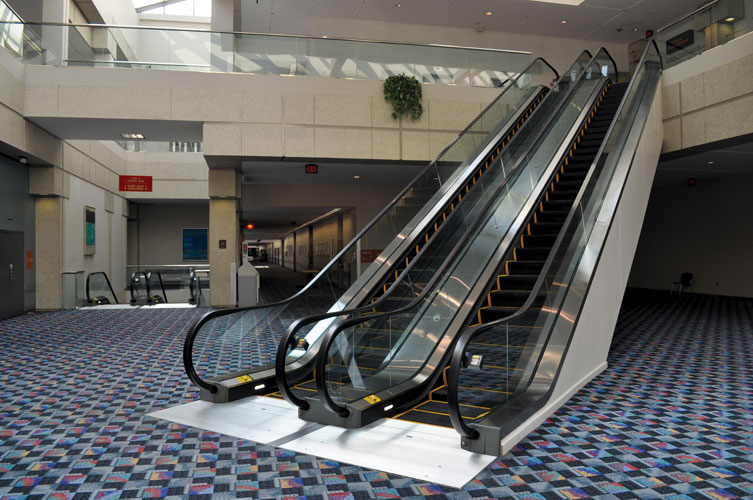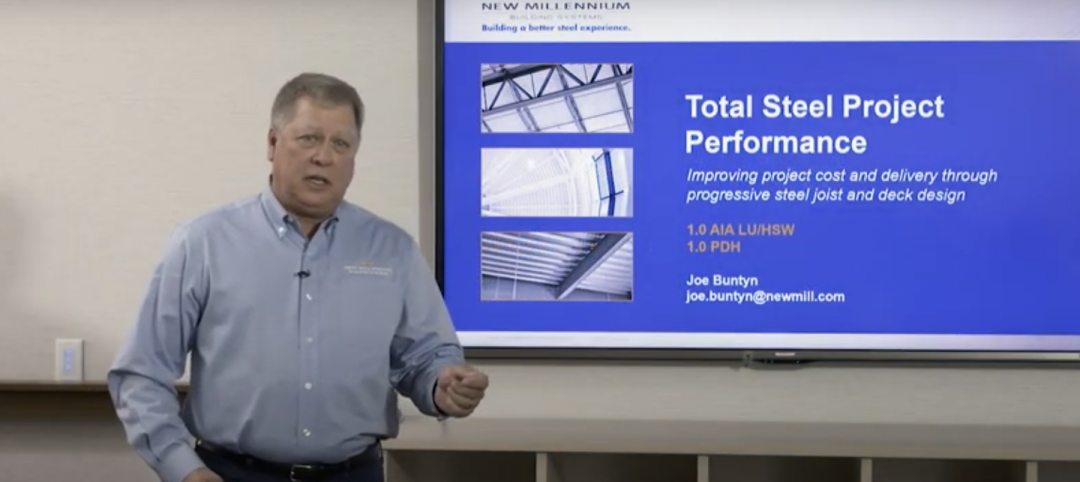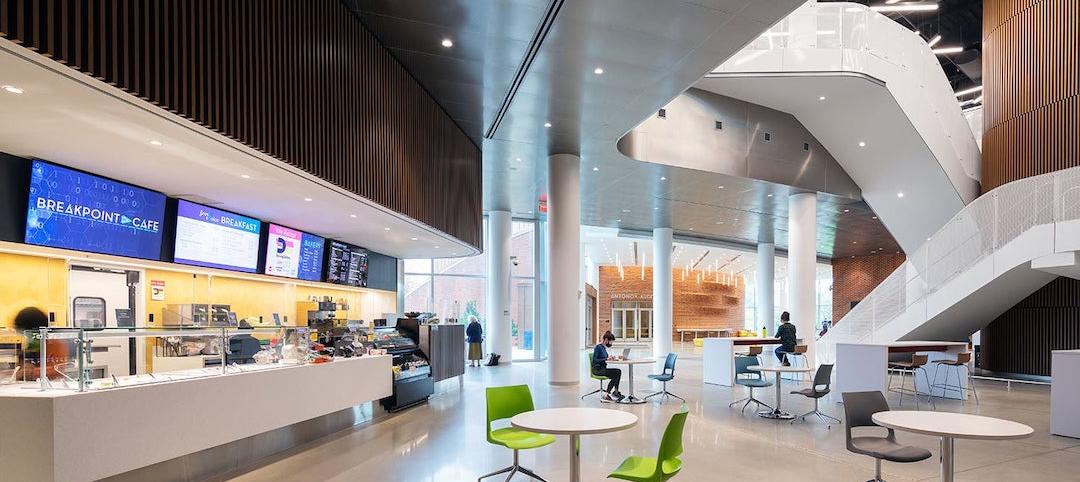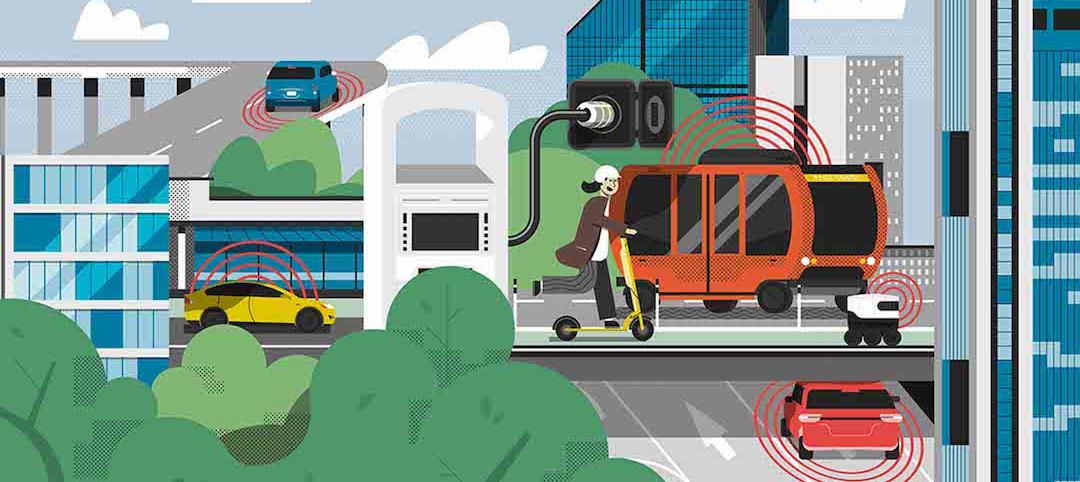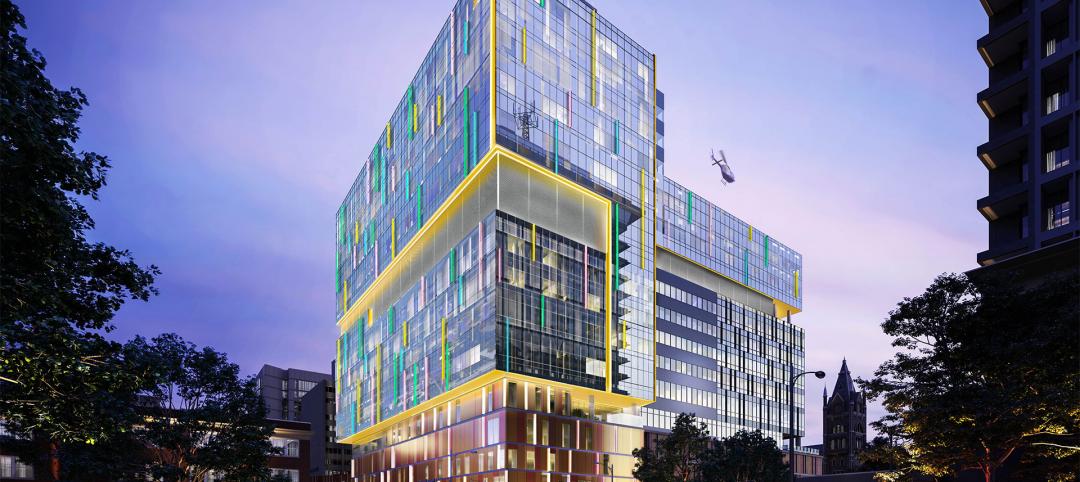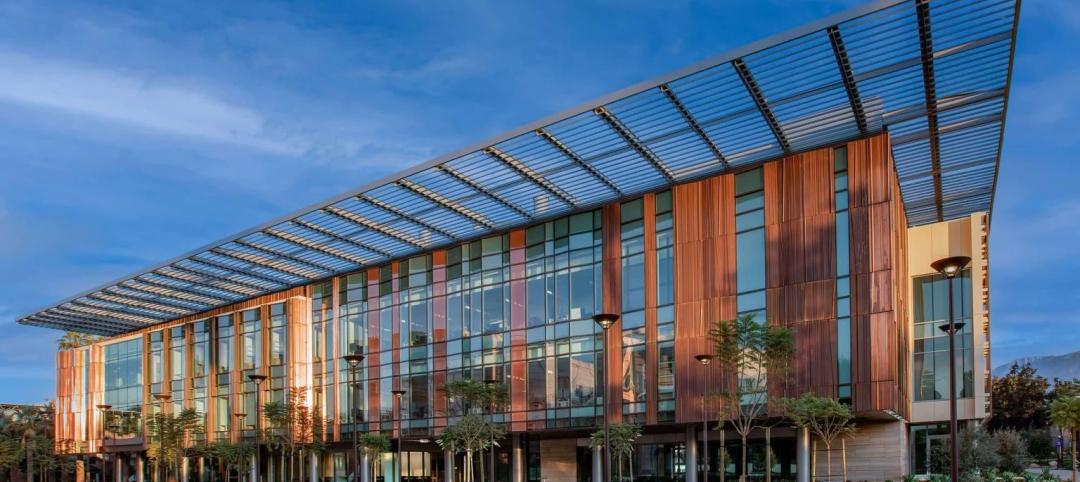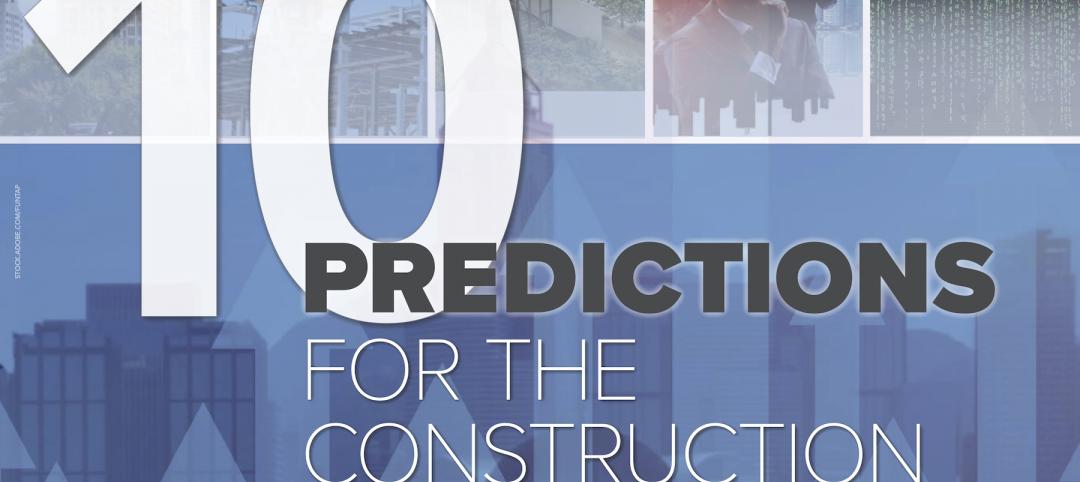Having to replace an escalator in a public facility of any kind is a major headache for the building’s management—all that debris and noise, not to mention the inconvenience to visitors and the annoying expense.
Imagine what it would be like to have to replace more than a dozen escalators, in a facility that might have to host a hundred thousand visitors on a busy day.
At Detroit’s Cobo Center, 14 glass balustrade escalators have been fully updated over the last two years, with more to come. The work has been clean and quiet, allowing building management to conduct business as usual.
Credit for this accomplishment goes to EcoMod, a complete escalator modernization system from Finnish vertical transport manufacturer KONE. The EcoMod system replaces the entire inner workings of an escalator unit without removing the supporting truss. “The escalators are equivalent to brand-new units but without the hassle,” says Claude Molinari, Cobo Center’s Assistant General Manager.
Meeting the needs of year-round activity at busy, busy Cobo
Opened in 1960 and expanded in 1989, Cobo Center is one of the country’s largest convention sites. The facility hosts events about 320 days a year, including the two-week-long North American International Auto Show each January. Daily attendance can reach 100,000. The center’s escalators are critical to moving people through four levels of space, but scant attention had been paid to them for decades, and they were prone to frequent breakdowns. By 2010, they had become a detriment to serving current clients and attracting future shows.
That’s when the center’s owner, Detroit Regional Convention Facility Authority, launched a multi-year, $300 million improvement and expansion program. This time the escalators would be overhauled. The question was how.
“We needed to replace the escalators, but we also had to stay open,” says Molinari. “We have several events that use every square inch of space in the building. We can’t close pieces of it. To tell someone that one-third of the building you normally occupy is not available this year would not be acceptable.”
Another consideration was the restaurants and retailers that operate beneath some of the trusses. A tear-out would mean those businesses would have to shut down for the duration. Again, unacceptable.
Avoiding total replacement
Total tear-out, the traditional escalator replacement method, was deemed impractical. “Total replacement is major construction,” says David Paxson, Project Manager and KONE Detroit Branch Manager. “The cost to bring in a general contractor to tear the building apart in a way that allows the truss to be removed is pretty expensive.”
Total replacements usually require cutting holes in roofs or façades because materials and equipment are too large to transport through the doors and windows. “It’s usually done at night, so you’re not doing heavy lifting around the public, which makes it even more expensive,” says Paxson.
With the custom-fabricated EcoMod retrofit option, it wasn’t necessary to touch the drywall, cladding, or any other parts of the building, according to KONE’s Kellie Lindquist, LEED Green Associate. The EcoMod components were built in modules that fit on a conventional skid and were assembled on site.
The Cobo project has been phased, starting with the escalators in poorest condition: 12 in 2011, two in 2012. Five more are in progress. During the first phase, crews took on four escalators at a time at opposite sides of the building.
The process entailed enclosing the workspace with temporary privacy walls, removing the old units, and cleaning and painting the trusses. The drive module was installed at the top, the turnaround station at the bottom. On the incline, brackets were welded to the truss, track was anchored to the brackets, and steps were laid atop the track. New balustrade and handrails were the final touches. It took about 10 weeks to complete four escalators.
The new units meet building codes that were not in place when the original escalators were installed. They come with energy-saving features such as a lubrication-free step chain, power regeneration, and LED lighting. They’re also equipped with missing step detectors, handrail speed sensors, a narrowed step-to-skirt gap, and other current safety features.
“The technology that gets installed is the same technology as if you put in all brand new,” says Lindquist. “We’re just installing it using a different method.”
Cobo Center’s Molinari says he conducted a cost comparison between total replacement and the KONE method and was able to document a 50% savings for the facility using the EcoMod system.
Molinari says he enjoys greater peace of mind knowing today’s visitors have a safer, quieter, more pleasant experience than in the past. “I was somewhat skeptical at first,” says Molinari. “I knew I had to accept a certain amount of inconvenience, but I was surprised how little interruption it caused. For the most part, people had no idea the escalators were being worked on.”
Related Stories
Sponsored | BD+C University Course | Jan 12, 2022
Total steel project performance
This instructor-led video course discusses actual project scenarios where collaborative steel joist and deck design have reduced total-project costs. In an era when incomplete structural drawings are a growing concern for our industry, the course reveals hidden costs and risks that can be avoided.
University Buildings | Jan 11, 2022
Designing for health sciences education: supporting student well-being
While student and faculty health and well-being should be a top priority in all spaces within educational facilities, this article will highlight some key considerations.
Green | Jan 10, 2022
The future of regenerative building is performance-based
Why measuring performance results is so critical, but also easier said than done.
Urban Planning | Dec 15, 2021
EV is the bridge to transit’s AV revolution—and now is the time to start building it
Thinking holistically about a technology-enabled customer experience will make transit a mode of choice for more people.
Healthcare Facilities | Dec 15, 2021
COVID-19 has altered the speed and design of healthcare projects, perhaps irrevocably
Healthcare clients want their projects up and running quicker, a task made more complicated by the shortage of skilled labor in many markets.
Giants 400 | Dec 3, 2021
2021 Hotel Sector Giants: Top architecture, engineering, and construction firms in the U.S. hospitality sector
Gensler, Jacobs, Suffolk Construction, and WATG top BD+C's rankings of the nation's largest hotel sector architecture, engineering, and construction firms, as reported in the 2021 Giants 400 Report.
2021 Building Team Awards | Nov 17, 2021
Caltech's new neuroscience building unites scientists, engineers to master the human brain
The Tianqiao and Chrissy Chen Institute for Neuroscience at the California Institute of Technology in Pasadena wins a Gold Award in BD+C's 2021 Building Team Awards.
Architects | Nov 9, 2021
Download BD+C’s 2021 Design Innovation Report
AEC and development firms share where new ideas come from, and what makes them click.
Architects | Nov 9, 2021
Download BD+C’s 10 Predictions for the Construction Industry in 2022
Our prognostications focus on how AEC firms will streamline and modernize their projects and operations.
Contractors | Nov 4, 2021
Coping with labor and material shortages in construction
Learn how New York-based Denham Wolf Real Estate Services is helping its nonprofit builder clients minimize delays and cost overruns from labor and materials shortages. Ron Innocent, Director of Project Management with Denham Wolf Real Estate Services sits down with BD+C's John Caulfield.


